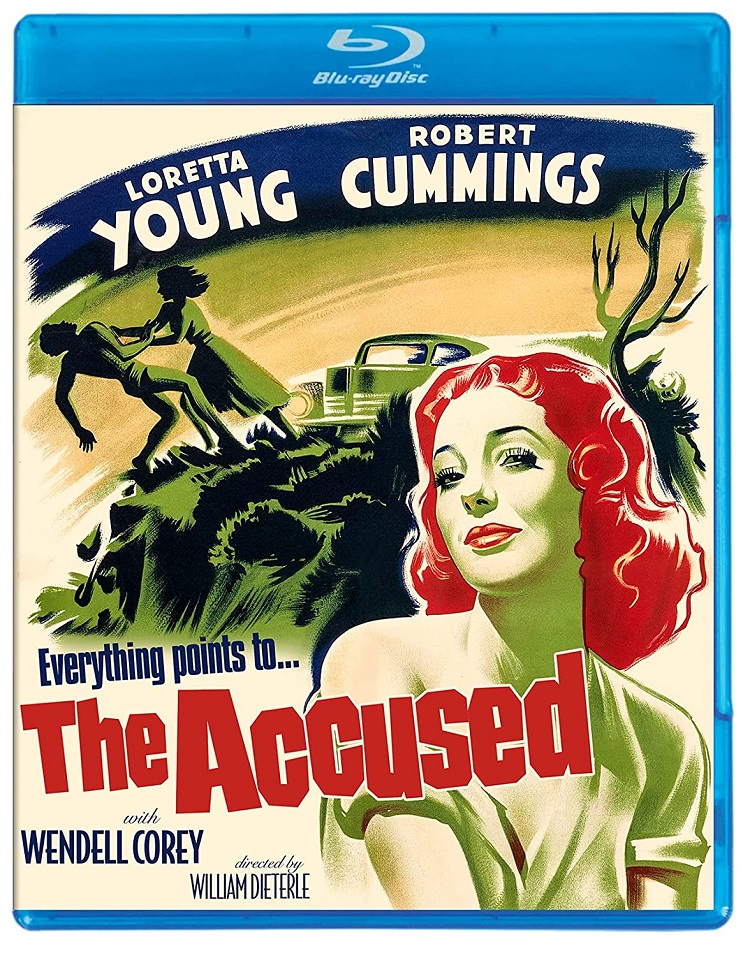
The classic film noir plot goes something like this: a man, usually a not too bright one, meets a woman (or a dame if you will) who seduces him then charms him into committing a crime for her. He gets caught only then to realize she never loved him in the first place. He was but a pawn in her schemes. Of course, there are lots of deviations from that basic plot in film noir, and plenty of films that do something completely different, but that’s a pretty good template for a great many films in the genre. If that’s true then The Accused (1949) works something like a film noir in reverse.
Early in the film, Dr. Wilma Tuttle (Loretta Young) finds herself in a spot of trouble. Fending off a would-be rapist, she winds up killing him. Worried that nobody will believe it was self-defense, she makes it look like an accident and pushes him off a cliff into the ocean. The attacker was a student of hers and soon enough she’s becoming friendly with his guardian, Warren Ford (Robert Cummings). She doesn’t exactly seduce him, she’s too sweet for that, but her charms are enough to make him help her out of this jam. It ends happily. So yeah, that’s basically the classic noir plot done backward. Instead of a sap who gets conned into committing a crime, he’s a decent guy who helps get her out of trouble. She’s not a femme fatale but a femme…whatever the opposite of fatale is.
Director William Dieterle hits the melodramatic queues as much as the noir ones. I’ve enjoyed Loretta Young in everything I’ve seen her in and she’s wonderful here. She’s got a face that’s both beautiful and full of vulnerability and it serves her well in this film. It begins with us watching her teaching her class. She’s trying to proctor an exam but she keeps being interrupted by an intelligent but difficult student, Bill Perry (Douglas Dick). Afterward, she gives him a talking to, and then she agrees to go to dinner with him in order to discuss his academic future.
He drives her to some cliffs where he likes to go fishing and insists that she watch. Then he insists she kiss him and pushes for more. That’s when she conks him over the head killing him. The next day she meets Warren, who was supposed to have met Bill that day, but when he didn’t show, he decides to ask his teachers about him. He takes an immediate liking to her. A lot of men take an immediate liking to her and one of the themes of the film is how difficult it is for a professional woman to exist in a land full of well-meaning men.
When Bill shows up dead, Warren involves himself in the investigation and takes Wilma along. He has a personal interest in the case, of course, but he’s also a lawyer and involves himself in that manner as well. Long stretches of the film act as a police procedural with the woman who committed the crime directly involved in trying to solve it. Wilma provides some wonderful noir voice-over narration which allows us to probe inside her mind. She’s afraid of getting caught but also begins to wonder what she did wrong to get herself into this situation. For a movie made in the late 1940s, it is pretty smart about how sexual assault affects one’s mental state.
Eventually, Warren begins to realize Loretta may be more involved in Bill’s death than previously assumed, but by then he’s too involved with her emotionally to not stop helping her. The police procedural turns into a courtroom drama, yet the blending of various genres doesn’t work against the film, but rather enhances it.
Loretta Young really is the reason to watch this film. Without her remarkable performance, the film would succumb to its melodramatic notions. She’s intelligent and strong, but vulnerable and scared. Though she kills a man early in the film and covers it up, we never feel like she’s the villain. Unlike so many other noirs where we hope the main character who has committed a crime will get caught, we root for her to get away with it. All of that is down to Young’s performance.
The Accused deserves to be better known. It is a terrific blend of noir, melodrama, romance, and procedural with a wonderful Loretta Young performance at its heart. Hopefully, this new Blu-ray release from Kino Lorber will allow it to be seen by more people.
Extras on this disk include a very nice audio commentary from Eddy Von Mueller and a bunch of trailers for other films available from Kino Lorber.